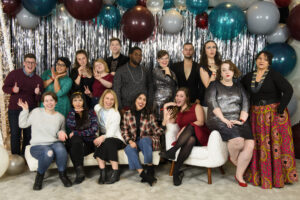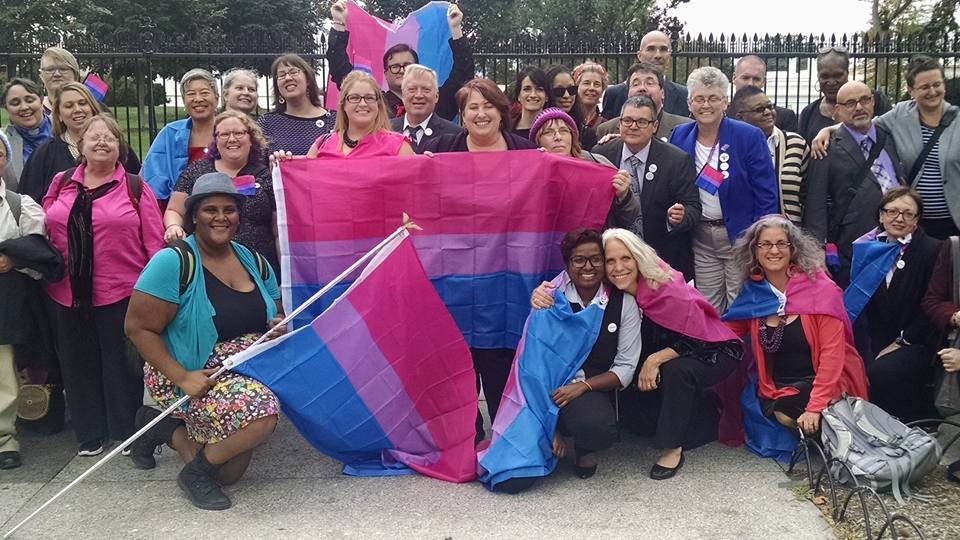By Helen Parshall
I think the process of writing this piece is a pretty good metaphor for being bisexual within the larger LGBTQ community. I stopped, rephrased, rewrote, and restarted so many times that I’ve completely lost count of what draft number this is.
This is the first time I sat down to delve into the ways the last five or so years have shaped my journey as an activist. It’s hard for me to look back on the triumphs in my career without also remembering the intense moments of anxiety and pain, and I’m deeply aware of those of us for whom that anxiety is a daily reality.
Of course, we don’t need the data to tell us that being bisexual comes with its host of mental health struggles. We’re too busy constantly fighting to survive and be seen and have our stories told, especially when it comes to activism and social justice spaces.
Entering LGBTQ activism has brought me both joy and pain— it’s what helped me come all the way out as bisexual—but it’s also what has broken my heart more times than I care to think about, let alone put on paper. The LGBTQ movement often leaves our community behind, despite the fact that we make up about half of the population it seeks to serve. It’s why the first time I came out in a professional, activist setting was terrifying.
Sure, I was interning at the nation’s largest LGBTQ civil rights organization, but in my few weeks there, I hadn’t yet had an experience that felt true to my fragile sense of my LGBTQ identity.
I was out as bisexual to my closest friends, but that was it. Coming out completely felt impossible when there was no tangible example of what the end goal looked like. I didn’t know of any bisexual celebrities who felt relatable, and my queer friends were just as lost at figuring out life after college as I was. I’d somehow missed the Grey’s Anatomy fandom at the time, and this was 2014, still two years before Sara Ramirez’s iconic speech at the True Colors Summit.
Preparing to meet with my internship mentor, Beth, for the first time was a challenge, and talking with her over coffee was a delicate balancing act. I was careful to use gender-neutral pronouns when talking about people in my life, and skirted around anything that felt real when she asked even the simplest questions to get to know me.
Real felt exposed. Real felt dangerous. Real felt like it could easily get back to my Catholic parents, who had no idea about my bisexuality (or so I thought at the time).
At some point during our coffee, though, she stopped me in the middle of a sentence. Bluntly, she said, “So, you’re bisexual?”
Her tone wasn’t really a question, but it didn’t need to be. Here was this adult-ier adult sitting across the table from me, who was an out and proud bisexual writer. And she saw me.
Beth was telling our stories on a national platform. There I was, 21 years old and fresh out of college with an English literature degree, just trying to figure my shit out and find where I fit in. Beth showed me that I fit perfectly, exactly where I was, because she was creating space for people like me. She was building a community of other bi+ employees within HRC—a bisexual employee resource group—and helping ensure that we had a space that was distinctly ours.
I never imagined that nearly four years later I would become the leader of that same Bi+ ERG.
Through the years, our meetings have been as much ad hoc therapy as they’ve been work-related. And out of those conversations where we process our experiences and our pain, we have created momentum for the organization.
One of my favorite parts of that process was a guide called “Coming Out as Bisexual to Your Doctor.” It was written after a meeting where we discussed our own experiences as bi+ people navigating health care settings. We realized that there needed to be a resource for all the other bi+ young people in the world who didn’t have access to the same things we did, so we created one. That kind of initiative—the decision to take things into our own hands and do the work that needed to be done—was how a lot of my work at HRC went.
I think it’s because as bisexual activists we have to fight and claw for our seat at the table. And then once we’ve made it to the table, we’re acutely aware that folks will pull that seat out from under us at any time. We have to shout just to be heard. Often the only ones who are around, willing to even listen, are our own community.
Sometimes that erasure is overt, but most of the time it isn’t and that’s the most dangerous part. Sometimes issues unique to the bisexual community just never make it to the top of the priorities list for “the movement.”
I would never have become a bisexual activist without building a family of other bi+ people around me. There’s something distinctly powerful in having a bi+ community that sees you exactly as you are without you having to say a word. We have to continue to build community and hold each other up as bi+ activists because it’s exhausting to fight day in and day out to be seen, especially when we know that if we don’t fight our community might be forgotten altogether.
I still struggle with that feeling of imposter syndrome, especially as I start a new job. In some ways, I feel like I’m still sitting in that coffee shop, afraid to put a name to myself and my identity. One day, I hope to be what Beth was for me to someone else looking to get their footing in bi+ activism and find who they are as a bi+ human.
But then I look at the people I’ve met and the stories I’ve helped to share, and I realize that maybe I’m already doing a little more than just getting bi.
A self-described “professional bisexual,” Helen Parshall is an avid writer and passionate social justice advocate, who uses digital media to bring visibility to marginalized communities. When not joining her housemates at a rally in D.C., Helen can be found reading a book or watching Doctor Who, curled up with one of the dogs in her life.

The HRC Bisexual Employee Resource Group 2019 Holiday Party.
Featured image: Bisexual activists from around the country gathered outside the White House, following the second Roundtable on Bisexual Issues in 2015.

